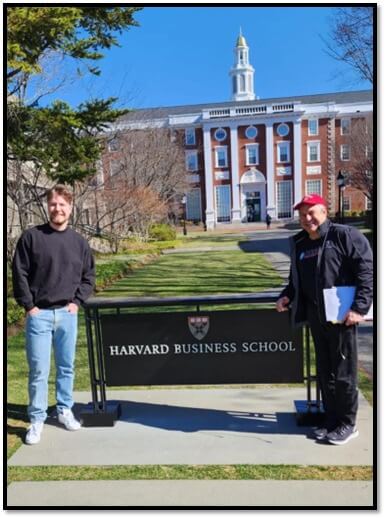A billionaire Gen Z influencer is reinventing philanthropy — with this South African rabbi’s help
Has MrBeast found a solution to getting younger generations involved in giving?

Rabbi Antony Gordon and Jimmy Donaldson, aka MrBeast. Courtesy of Antony Gordon
The YouTube phenomenon known as MrBeast just pulled off the kind of philanthropic home run you almost never hear about: He raised more than $40 million for a water charity from his largely Gen Z audience — in just one month.
When I mentioned to a friend how impressed I was by the 27-year-old’s approach to philanthropy, he said, “You should talk to his rabbi.”
To which I said, “MrBeast has a rabbi?”
To be clear, MrBeast — real name Jimmy Donaldson — is not Jewish. He was raised by a religious Christian mother, and his current level of observance is, like many aspects of his life, a source of endless online speculation.
But Rabbi Antony Gordon, who met the billionaire influencer four years ago and is now a strategic adviser to Beast Enterprises, has a front-row seat to how MrBeast is transforming giving — and what the Jewish community can learn from him.
“He’s made giving cool,” Gordon said over coffee at the Four Seasons Hotel Beverly Hills. “He’s made it viral.”
“That’s a paradigm shift. If you can make giving cool, you’re going to do something incredible for the next generation.”
There’s nothing accidental about Donaldson’s viral success, Gordon said. He’s witnessed the creator’s relentless focus on developing engaging and novel content. Donaldson has gamified giving by introducing an element of competition, constantly raising stakes, and coming across as authentic and down-to-earth.
But perhaps most importantly, Gordon said, MrBeast has infused his entire business model with altruism.
“I don’t have to do this stuff, but I want to use my platform for good,” Donaldson told Variety recently about his #TeamWater charity. “We like to use our reach to educate people and use that revenue to positively impact people’s lives.”
Envelopes stuffed with cash
In late 2021, a mutual acquaintance introduced Gordon to Donaldson, leading to an invitation for Gordon to visit the Greenville, N.C., studios where most of the MrBeast videos are shot.
When he arrived, he saw staff opening envelopes from Donaldson’s youngest viewers, who don’t have online credit card accounts, addressed to MrBeast to use for his philanthropies.
“I personally saw hundreds of envelopes come in from kids with $2 and $3, with their allowance money in it, and handwritten notes that said, ‘I want to help,'” Gordon said.
Since that initial meeting, the South African-born Gordon, who has degrees in law and business from Harvard University as well as Orthodox rabbinic ordination, has served as a sounding board and connector for the hugely popular influencer, which makes him, in a sense, MrBeast’s rabbi. (Gordon also works with Donaldson on some of his for-profit ventures, including his Feastables snack business.)
“His gut sense of what will work and what won’t is off the charts,” Gordon said when I asked about his initial impression of Donaldson. “And his mind is very unusual — he’s hyperfocused.”
Philanthropy for gamers
Take #TeamWater. On Aug. 1, MrBeast announced that he and fellow influencer Mark Rober aimed to raise $40 million to fund clean water projects in poor communities around the world, including the United States. By Aug. 15, #TeamWater had raised $30.5 million, including $15.5 million in a 15-hour online marathon. By Sept. 1, it had passed the full $40 million goal.
The campaign is a case study in MrBeast’s approach. It launched with a trademark high-energy video: “This could be one of the largest philanthropy projects in history!” MrBeast said, standing in front of a well in an unnamed Malawi village — just as the well exploded like Old Faithful behind him.
The campaign followed a novel strategy, as MrBeast joined forces with 3,000 other influencers, with a combined 3 billion followers. The campaign’s website claimed a $1 donation would supply one person with clean water for a year — then listed each donor by years of impact, giving the whole drive a kind of competitive edge.
Gordon called it “edutainment” — entertainment, but values-based.
“The idea of character, morals, integrity — I think there’s a conspicuous absence in the secular world, and I think he’s solved it,” Gordon said.
Gordon sees evidence of those qualities even in the hyperbolic YouTube videos that have earned MrBeast 424 million followers, making him the platform’s most popular creator. In one, Donaldson and five friends spent seven days stranded on a raft in the middle of the ocean.
“How do you survive on a raft 100 miles from shore?” Gordon said. “Because five guys had each other’s back. That’s a tremendous lesson.”
That video has, to date, 383 million views.
Over the years, Donaldson’s stunt videos have leaned increasingly into altruism. Late one night, I turned on “I Adopted 100 Dogs!” in which Donaldson and his team found owners for 100 soon-to-be-euthanized dogs. It has 336 million views. I went to bed with happy tears in my eyes.
“You have to make videos that people are going to choose to watch because they enjoy the video” when it comes to using YouTube and social media to fuel philanthropic drives, said Darren Margolis, a South African real estate executive who headed Beast Philanthropies until last January, in a phone interview. “We never ended the video on a downer. We never left the person feeling depressed.”
Authenticity, scaled
It’s not that younger Americans don’t give. 74% of Jewish Gen Xers and 64% of millennials and younger are donors to a charity, according to a 2022 Ruderman Family Foundation study, compared to 84% of Jewish baby boomers.
The key statistic from that survey: The majority of Gen Zers — 60% — said they were inspired to give by a message or image they saw on the internet, and 66% said most of their activism takes place online.
And that’s where they’ll find MrBeast.
“He’s mastered the algorithm,” Gordon, who helped arranged for Harvard Business School to use Donaldson as a case study in 2023, said. “Gen Z and millennials find him more believable, more authentic.”

Part of that comes from Donaldson’s own story. Raised in a small town by a financially struggling single mother, Donaldson dropped out of college to, essentially, post to YouTube. He worked on it for five years before his first video gained traction.
“He didn’t give up,” Gordon said.
But since achieving a net worth estimated at $1 billion, Donaldson has faced criticism for inauthenticity, including several lawsuits. Last September, five participants in his Amazon series Beast Games filed suit alleging “toxic work conditions” and sexual harassment. Donaldson has said the suits are baseless.
And the troubled BeastBurger chain of fast-food restaurants, a magnet for consumer complaints and online memes of vile-looking burgers, has dogged Donaldson, who has distanced himself from the company that contractually runs it.
His style of philanthropy has drawn criticism, as well, for suggesting that philanthropy can be effortless, instantaneous and fun — when anyone who’s ever tried to affect change knows it can be a slog.
But Gordon said that when it comes to Donaldson’s charitable work, his critics are missing the bigger, positive picture.
“He’s helped this generation understand that it’s not all about me,” Gordon said, “that we’re part of an extended family, and that it’s not about climbing all over each other to get to the top.”
Can an online personality help heal young people whose crises stem in part, according to experts, from being too online? Gordon is hopeful — because Donaldson presents an alternative to the carefully curated and falsified personalities who fill much of the social media world.
“I told him in Hebrew the word for ‘face’ is plural, panim, because we each have an inner and an outer face,” Gordon said. “The rabbinic commentators say you can never have peace of mind unless your internal and your external faces are in sync. Jimmy is raw, real and truthful to himself, and that’s the ideal.”
















